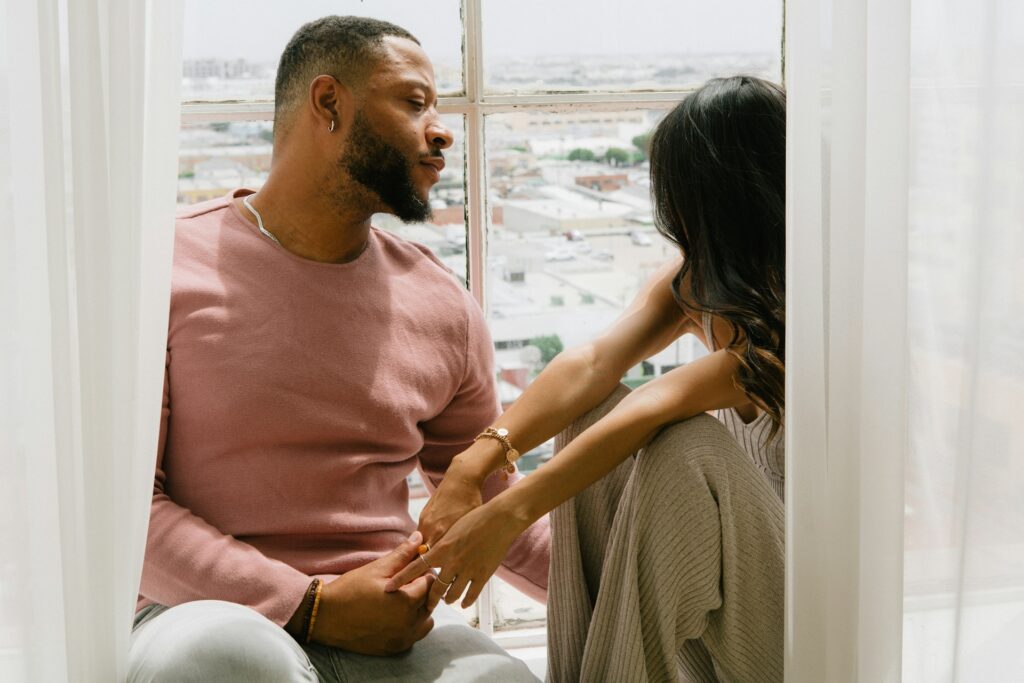Opening up emotionally doesn’t have to feel like handing someone a weapon.

It’s possible to share what you’re feeling without losing your footing or bracing for judgement. The key isn’t to share everything all at once; it’s to be thoughtful, intentional, and grounded as you do it. When you approach vulnerability with care instead of urgency, it becomes something you can control, not something that controls you. Here are a few ways to express your inner world without feeling overly exposed or out of your depth.
1. Start with what feels safe to say, not what feels dramatic.

When you’re finally ready to share, it’s tempting to go straight to the big reveal. However, it’s often better to begin with something small and manageable, something you’re okay with people knowing, even if they don’t fully understand it. This gives you time to adjust to being seen without dumping everything at once. Emotional honesty doesn’t have to start with your deepest wound—it can begin with something softer that still matters to you.
2. Use language that reflects where you are, not where you think you should be.

You don’t have to sound like you’ve got it all figured out. Saying, “I’m not sure how to say this” or “I’m still working through it” lets you be real without putting pressure on yourself to sound polished or certain. Speaking from where you are right now is more authentic, and often more effective, than trying to frame things as if you’ve already processed them perfectly.
3. Choose the right person, not just the closest one.

Not everyone deserves access to your vulnerability. Opening up to someone doesn’t mean picking the person who’s physically nearest or most convenient. It means choosing someone who’s shown they can hold your truth gently. When you trust the container, it’s easier to let your guard down. Feeling safe in the relationship makes the risk of being seen feel less like a threat and more like a relief.
4. Don’t apologise for having feelings.

It’s easy to slip into saying, “Sorry if this sounds stupid” or “Sorry, I don’t mean to be dramatic.” But apologising for your emotions sends the message that they’re somehow wrong or inconvenient before you’ve even expressed them. Instead, try grounding yourself in the belief that your feelings are valid, even if they’re messy or hard to articulate. You’re allowed to have them. You don’t need to shrink to make them easier for other people to handle.
5. Speak from your experience, not your assumptions.

It’s tempting to frame your feelings around what you think everyone else will think: “You probably don’t care,” or “I know this sounds ridiculous.” The thing is, those phrases actually create distance and tension instead of connection. Stick to what’s true for you. Say, “This is hard for me to talk about,” or “I felt really alone when that happened.” That keeps the focus on your experience and gives the other person a chance to meet you there without feeling accused or boxed in.
6. Let people know what you need before you start.

Sometimes the hardest part of opening up is the fear of what kind of response you’ll get. Saying, “I don’t need advice right now, I just want to talk,” or “I’m not sure I need a solution—I just need to be heard,” can help set the tone. When people know what kind of support you’re looking for, they’re more likely to respond in a way that feels comforting instead of overwhelming.
7. Share a little, then check in with yourself.

You don’t have to lay everything out at once. Sharing a small piece of what you’re feeling, then taking a moment to see how that feels, helps you stay connected to yourself while still being open. This makes the process feel more collaborative. You’re not handing over your emotions—you’re inviting someone in, one step at a time, with your own emotional footing still intact.
8. Use grounding tools if you start to spiral.

If you feel overwhelmed while opening up, having a way to anchor yourself helps. That could mean holding something in your hand, focusing on your breathing, or simply pressing your feet into the ground. Being emotionally vulnerable doesn’t have to mean being emotionally unmoored. You can stay grounded in your body even while expressing things that feel raw or hard.
9. Let the silence be part of the conversation.

You don’t need to fill every pause with more explanation. Sometimes silence gives you space to breathe, and gives the other person time to take in what you’ve shared without rushing to respond. Emotional honesty doesn’t always need an instant reply. It needs room. Letting a conversation have space makes it easier for both people to process and respond thoughtfully.
10. Acknowledge the discomfort without judging it.

It’s normal to feel awkward or unsure when being open. Saying something like, “This is hard for me to say,” or “I feel weird talking about this” doesn’t ruin the moment—it makes it more human. You don’t have to hide your discomfort. Naming it lets you move through it instead of getting stuck in it. Most people respect vulnerability when it’s honest, even if it’s messy.
11. Stop trying to convince people to care.

When you open up, the goal isn’t to earn someone’s empathy—it’s to express something that matters to you. If you’re constantly trying to explain why your feelings are valid, it’s possible you’re talking to someone who can’t hold space. Your emotions don’t need to be justified with a thesis. If someone really wants to understand, they’ll lean in without needing proof that your experience is worth hearing.
12. Be clear about your emotional limits.

If a conversation is going too deep, too fast, or making you feel unsafe, it’s okay to pause. Saying, “I think I’ve said enough for now,” or “I want to come back to this later,” is a way to protect your energy while still showing up with honesty. Being vulnerable doesn’t mean being exposed at all costs. It means being in tune with yourself and knowing when to open up, and when to step back.
13. Remind yourself that emotional honesty is a strength.

It’s easy to feel like being vulnerable makes you weak, needy, or over-emotional. However, the truth is, it takes more courage to be open than to hide behind a wall of detachment or performance. Every time you choose to speak from the heart, you reinforce your own emotional resilience. You’re not just letting someone else in—you’re showing yourself that you can handle being seen without falling apart.


